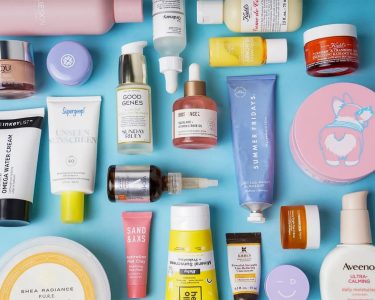Do you want plump, radiant skin that turns heads and makes people ask for your skincare secrets? Well, the secret lies in exfoliation. It’s time to ditch those harsh scrubs and embrace this essential step in your beauty routine. In this blog post, we’ll reveal the top 5 reasons why exfoliating is a must for achieving vibrant and glowing skin. Get ready to uncover the benefits of sloughing off dead skin cells and revealing new, refreshed-looking skin underneath!
What is exfoliation?
Exfoliation is the process of removing dead skin cells from the surface of your skin. This can be done chemically, with a physical exfoliant like a scrub, or with an abrasive material like a loofah. Exfoliating regularly helps to keep your skin looking fresh and radiant by encouraging cell turnover and preventing build-up of dulling dead skin cells. It also helps to unclog pores and clear away any excess oil or sebum that could lead to breakouts. In short, exfoliation is essential for achieving and maintaining glowing, healthy skin!
The benefits of exfoliation
When you exfoliate, you remove the dead skin cells that can build up on the surface of your skin and cause it to appear dry, dull, and flaky. Exfoliation can also help to unclog pores and prevent breakouts. In addition, by stimulating blood flow and promoting cell turnover, exfoliation can give your skin a healthy glow.
The different types of exfoliants
There are two primary types of exfoliants: physical and chemical.
Physical exfoliants work by mechanically removing dead skin cells from the surface of the skin. They usually come in the form of a scrub or brush, and can be used on both the face and body.
Chemical exfoliants work by dissolving the “glue” that holds dead skin cells together. This allows them to be sloughed off more easily, revealing fresh, radiant skin underneath. Chemical exfoliants come in many different forms, including serums, peels, and masks.
The best way to achieve glowing skin is to use a combination of both physical and chemical exfoliants. For best results, start with a physical exfoliant (such as a scrub or brush) to remove any visible dead skin cells. Follow up with a chemical exfoliant (such as a serum, peel, or mask) to deeply cleanse pores and brighten dull skin.
How to exfoliate your skin
Exfoliation is one of the most important steps in any skincare routine. It helps to remove dead skin cells that can build up on the surface of the skin, which can lead to a dull, uneven complexion. Exfoliating also allows your other skincare products to work more effectively, as it provides a clean base for them to be absorbed into. There are many different ways to exfoliate your skin, but here are some of the most popular methods:
1. Physical exfoliants: These include scrubs, brushes, and sponges that physically remove dead skin cells from the surface of the skin. You’ll need to be careful not to scrub too hard, as this can damage the skin.
2. Chemical exfoliants: These contain ingredients like glycolic or lactic acid, which help to break down the bonds between dead skin cells so they can be sloughed off more easily. Chemical exfoliants can be harsher on the skin than physical exfoliants, so it’s important to choose one that’s suitable for your skin type and start with a lower concentration if you’re new to using them.
3. Enzymatic exfoliants: These usually contain fruit enzymes that help to dissolve dead skin cells. They tend to be more gentle on the skin than other types of exfoliants and are a good choice if you have sensitive skin.
Whichever type of exfoliant you choose,
Exfoliating recipes
There are many reasons why exfoliation is essential for glowing skin. Exfoliation helps to remove dead skin cells that can build up on the surface of the skin, which can make the skin look dull and dry. Additionally, exfoliation stimulates blood flow and cell turnover, which helps to give the skin a natural glow. Furthermore, exfoliation can help to unclog pores and prevent breakouts.
There are a variety of ways to exfoliate the skin. You can use an abrasive device such as a loofah or scrub brush, or you can use an exfoliating product that contains ingredients such as salt, sugar, or coffee grounds. You can also make your own DIY exfoliating recipe at home using ingredients such as oats, honey, or lemon juice.
Whichever method you choose, be sure to use gentle circular motions when scrubbing the skin, and avoid scrubbing too hard as this can irritate the skin. Rinse off with warm water afterwards and follow up with a moisturizer to soothe the skin. Exfoliating once or twice a week is generally sufficient for most people, but if you have dry or sensitive skin, you may want to limit exfoliation to once a week or every other week.
Conclusion
Exfoliation is a critical step in maintaining healthy, glowing skin. It helps to remove dead skin cells, dirt, and oils that can clog your pores. It also encourages improved circulation, giving you an even complexion. With regular exfoliation and proper hydration for your skin type, you can make sure that your glow never fades away!




